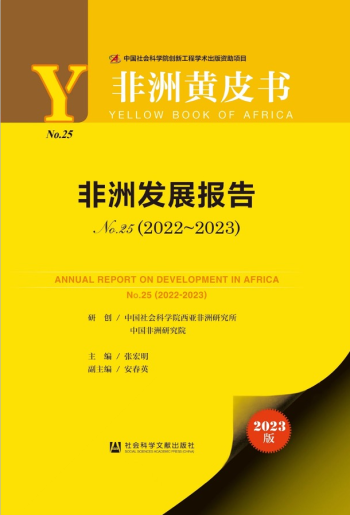ANNUAL REPORT ON DEVELOPMENT IN AFRICA No.25 (2022-2023)

Abstract
With the combination and interaction of multiple factors, including the profound changes of the century, the global epidemic, the Ukraine crisis, the wold economic recession and the climate disaster, the situation in Africa in 2022 shows the following characteristics.
First, the political situation of Africa keep going with overall stability and local instability. Presidential and parliamentary elections were held smoothly in Somalia Kenya, Angola, Equatorial Guinea, Gambia, Lesotho, the Republic of Congo, Sao Tome and Principe and Senegal, with political power handed over and transferred smoothly. The Ethiopian Federal Government and the “Tigray People's Liberation Front” signed a peace agreement in South Africa in November, which resulted in a successful ceasefire. At the same time, factors of instability and insecurity persisted in Africa. These were highlighted by persistent tension in the eastern region of the Democratic Republic of Congo and the complex developments in the Great Lakes region. “Al-shabaab” and other extremist groups in Somalia waged war in the Horn of Africa, and the “Followers of the Prophet” terrorist group in northern Mozambique stepped up terrorist attacks. Two coups in Burkina Faso and attempted coups in Guinea-Bissau, Sao Tome and Principe and Gambia took place. Political transitions in Mali, Guinea, Chad and Sudan went through twists and turns. All this posed serious challenges to the political and security situation in parts of Africa.
Second, the African economy is forward with burden, coexisted with both vulnerability and resilience. On the one hand, the African economy, which is highly dependent on the external environment, faces severe challenges due to the combination of factors such as the plummeting global economic growth, tighten international financial conditions, high inflation, geopolitical crisis and climate disaster. This is also reflected in the relevant macroeconomic indicators for 2022: Africa's economic growth slowed from 4. 8% in 2021 to 3. 8% in 2022; Inflation remained high in most African countries, averaging 13. 8% , the highest since 2008. The public debt to GDP ratio reached to 70% (debt ratio) , with debt service burden increased; High international energy, fertilizer and food prices triggered the crisis in Ukraine have increased the import bill of net oil and food importing countries in Africa, resulting in more extreme poverty countries in Africa. On the other hand. Africa's economy is resilient and is expected to bottom out in 2023 as COVID-19 control measures eased and international market demand increasing.
Third, Africa enjoys strong momentum of self-strengthening through unity and greater strategic independence. Against the backdrop of major changes, Africa has accelerated its integration process and spoken with one voice. Its strategic independence and international standing have increased. In terms of external relations, African countries adopt a flexible, pragmatic and non-exclusive balanced policy in the face of conflicts between major powers outside the region, oppose the introduction of great power competition into Africa by the United States and the West, and refuse to “choose sides”. On the political and security front, the AU and sub-regional organizations have taken the initiative to address regional security challenges and focused on solving African problems in an African way. In terms of economic development, African countries try to seize the opportunities of digital and green transformation by strengthening regional integration to speed up the pace of economic recovery and development. In addition, the AU is also actively seeking to join the G20 to strengthen Africa's visibility and voice in the international multilateral arena. African countries exert growing influence on major international issues such as the reform of the UN Security Council, tackling climate change and opposing unilateral sanctions.
In 2022, China-Africa relations withstood many tests and challenges and achieved positive results in political contact, economic cooperation and people-to-people exchanges, pushing the China-Africa comprehensive strategic and cooperative partnership to a higher level.
Keywords: African; Political Situation; Safety Problem; Economic Resilience; Strategic Autonomy
